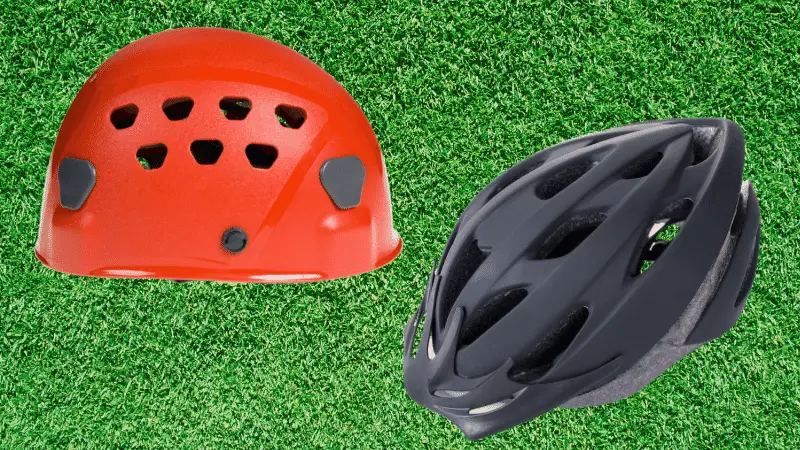You may have asked yourself whether you can use a climbing helmet for biking. Some people say that it is not safe to do so, while others claim that it is perfectly fine. So, which is the truth? In this blog post, we will take a look at both sides of the argument and try to come to a conclusion.

Is a climbing helmet the same as a bike helmet?
When it comes to deciding which helmet is best for your outdoor activity, it’s essential to know the differences between a climbing helmet and a bike helmet. While both helmets are designed with safety in mind, they are not interchangeable.
A bike helmet is designed to provide protection when riding on smooth surfaces such as pavement, while a climbing helmet is specifically meant for rock climbing or other activities that involve potential falling debris or sharp objects.
A biking helmet may provide good coverage of the head and face, but it will not be able to protect against flying rocks or airborne threats that climbers or other outdoor adventurers face.
On the other hand, a climbing helmet will encompass the entire head and be adjustable to ensure a snug fit. It also lasts much longer than bike helmets due to its sturdier construction and ability to handle heavy debris from falling objects.
So if you’re looking for protective headgear, make sure you choose one based on the specific activity: use a bike helmet for cycling, and an appropriate climbing helmet for scaling rock faces!
Do you really need a helmet biking?
When it comes to biking, helmets don’t get nearly enough credit for the role they play in keeping us safe. Studies have shown that wearing a helmet when cycling can reduce the chance of head injury by up to 88 percent and can also reduce risks of more serious deterioration in the event of an accident.
While some may argue that wearing a helmet can be uncomfortable or unnecessary during basic leisure biking, you never know when someone on the road might act unpredictably or when unseen hazards (such as potholes or sidewalks) might appear in your path.

So ultimately, it is always better to be safe than sorry! In addition to extra protection in traffic, helmets are also important for staying visible while out on the road; bright colors and reflective patches give cyclists added exposure so they won’t be overlooked by drivers.
Whether you’re an avid cycler or just an occasional leisure biker, investing in a good-quality helmet is well worth it. With proper care and maintenance, one good helmet can last many years to come — making it a sound investment for safety and peace of mind. So don’t skimp on quality when buying your next cycling helmet – snap on that headgear and hit the roads with confidence!
Do I need a special helmet for mountain biking?
If you’re considering mountain biking, one thing to consider is whether or not you need a special helmet. The answer depends on the type of biking that you’ll be doing and the terrain that you’ll encounter.
If your rides will be along softer trails and dirt roads, then a basic cycling helmet should provide sufficient protection.
However, if you plan on riding more aggressively or tackling harder terrain such as large rocks and sharp turns, then a mountain biking-specific helmet may serve you better.
Such a helmet is usually constructed from tougher materials for improved durability and includes MIPS technology to help redirect impact energy away from the head.
Ultimately, when selecting a mountain bike helmet it’s best to choose one that covers all of your needs while still providing the level of comfort and breathability that you need while out on the trails.
Whether or not you decide to invest in a dedicated mountain biking helmet, make sure that your head is properly protected at all times!
Can I use a road helmet for mountain biking?
Many cyclists are unaware that helmets are specially designed for different types of riding. While some may believe you can use any type of helmet for any activity, this is not always the case.
For instance, when it comes to mountain biking, relying on a road helmet could leave you exposed to risks that a properly fitted mountain bike helmet can protect against. A mountain bike helmet is typically lightweight and aerodynamic to provide maximum comfort and breathability as you make your way up rocky terrain.
Many helmets include MIPS (Multi-Directional Impact Protection System) technology built into the lining, which helps absorb and redistribute forces in the event of an accident.
So if you’re considering taking your cycling adventures off-road, investing in a MIPS road helmet designed specifically for mountain biking is an essential safety precaution you won’t want to miss out on.
Final Thoughts
In conclusion, it is not recommended to use a climbing helmet for biking. While a climbing helmet may offer some protection in the event of an accident, it does not provide the same level of breathability and comfort that dedicated cycling helmets possess.
Furthermore, mountain biking specific helmets are designed with features like MIPS technology to help redirect impact energy away from the head.
Therefore, if you’re looking to stay safe and comfortable while cycling on or off-road, it’s best to invest in a quality cycling helmet that is designed for the type of riding you plan on doing.
